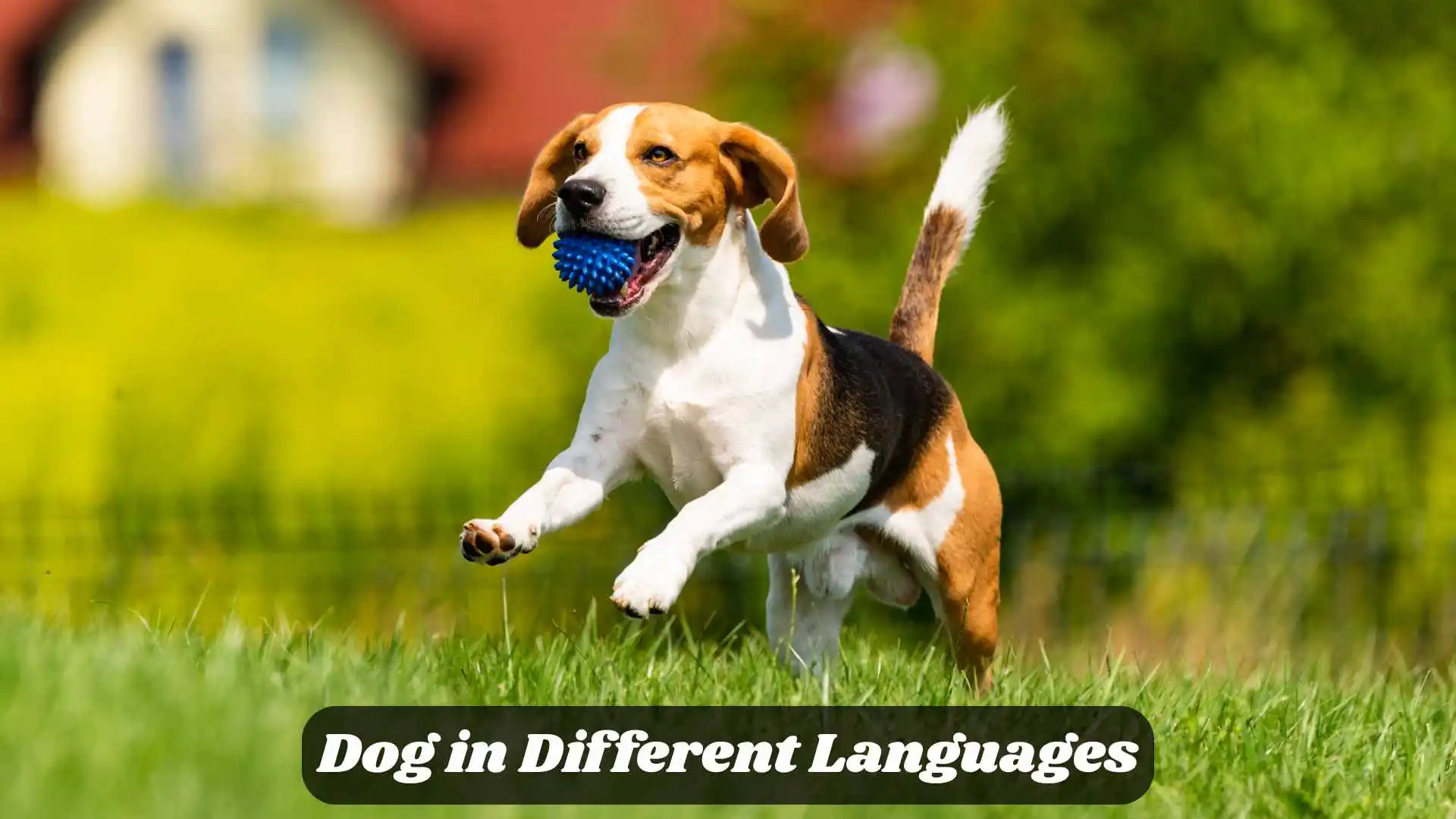Have you ever wondered how people around the world say “Dog”?
From loyal companions to brave protectors, dogs have been part of human life for thousands of years — loved in every corner of the globe.
In this article, we’ll explore Dog in Different Languages, uncovering how this loyal friend is named and celebrated across cultures.
This isn’t just another language list — it’s written especially for you, the reader who loves both words and the warmth of our four-legged friends.
As you read, you’ll discover how each language expresses the same universal affection we feel for dogs.
By the end, you might find a new favorite word for “dog” — one that reminds you just how connected people (and pups!) truly are around the world.
🌍 How to Say “Dog” in 70 Different Languages
- English (🇬🇧) – Dog | Pronunciation: dawg
Example: The dog is my best friend. - Spanish (🇪🇸) – Perro | Pronunciation: PEH-ro
Example: El perro está durmiendo. (The dog is sleeping.) - French (🇫🇷) – Chien | Pronunciation: shee-EN
Example: Le chien est fidèle. (The dog is loyal.) - German (🇩🇪) – Hund | Pronunciation: hoond
Example: Der Hund spielt im Garten. (The dog plays in the garden.) - Italian (🇮🇹) – Cane | Pronunciation: KAH-neh
Example: Il cane è molto dolce. (The dog is very sweet.) - Portuguese (🇵🇹) – Cão | Pronunciation: kow
Example: O cão corre no parque. (The dog runs in the park.) - Russian (🇷🇺) – Собака (Sobaka) | Pronunciation: soh-BAH-kah
Example: Собака лаet на улице. (The dog barks outside.) - Chinese (Mandarin) (🇨🇳) – 狗 (Gǒu) | Pronunciation: go
Example: 我喜欢我的狗。 (I love my dog.) - Japanese (🇯🇵) – 犬 (Inu) | Pronunciation: ee-noo
Example: 犬はとてもかわいいです。 (The dog is very cute.) - Korean (🇰🇷) – 개 (Gae) | Pronunciation: geh
Example: 개가 집에 있어요. (The dog is at home.) - Arabic (🇸🇦) – كلب (Kalb) | Pronunciation: kalb
Example: الكلب يلعب في الحديقة. (The dog is playing in the garden.) - Hindi (🇮🇳) – कुत्ता (Kuttā) | Pronunciation: koot-tah
Example: मेरा कुत्ता बहुत प्यारा है। (My dog is very cute.) - Urdu (🇵🇰) – کتا (Kutta) | Pronunciation: kut-tah
Example: میرا کتا بہت وفادار ہے۔ (My dog is very loyal.) - Turkish (🇹🇷) – Köpek | Pronunciation: kuh-PEHK
Example: Köpek bahçede oynuyor. (The dog is playing in the yard.) - Greek (🇬🇷) – Σκύλος (Skýlos) | Pronunciation: skee-los
Example: Ο σκύλος κοιμάται. (The dog is sleeping.) - Hebrew (🇮🇱) – כלב (Kelev) | Pronunciation: keh-lev
Example: הכלב רץ בפארק. (The dog runs in the park.) - Thai (🇹🇭) – สุนัข (Sunak) | Pronunciation: soo-nak
Example: ฉันรักสุนัขของฉัน. (I love my dog.) - Vietnamese (🇻🇳) – Chó | Pronunciation: chaw
Example: Con chó đang sủa. (The dog is barking.) - Swahili (🇰🇪) – Mbwa | Pronunciation: m-bwah
Example: Mbwa wangu anapenda kucheza. (My dog loves to play.) - Zulu (🇿🇦) – Inja | Pronunciation: een-jah
Example: Inja yami ithanda ukudlala. (My dog loves to play.) - Polish (🇵🇱) – Pies | Pronunciation: pyes
Example: Mój pies jest wierny. (My dog is faithful.) - Dutch (🇳🇱) – Hond | Pronunciation: hond
Example: De hond blaft luid. (The dog barks loudly.) - Swedish (🇸🇪) – Hund | Pronunciation: hoond
Example: Hunden sover på soffan. (The dog sleeps on the couch.) - Finnish (🇫🇮) – Koira | Pronunciation: koy-rah
Example: Koira leikkii pihalla. (The dog plays in the yard.) - Hungarian (🇭🇺) – Kutya | Pronunciation: koo-tyah
Example: A kutya fut a kertben. (The dog runs in the garden.) - Czech (🇨🇿) – Pes | Pronunciation: pes
Example: Pes spí doma. (The dog sleeps at home.) - Romanian (🇷🇴) – Câine | Pronunciation: kuh-ee-neh
Example: Câinele meu este prietenos. (My dog is friendly.) - Ukrainian (🇺🇦) – Собака (Sobaka) | Pronunciation: soh-bah-kah
Example: Моя собака грається. (My dog is playing.) - Persian (🇮🇷) – سگ (Sag) | Pronunciation: sag
Example: سگ من مهربان است. (My dog is kind.) - Malay (🇲🇾) – Anjing | Pronunciation: AHN-jing
Example: Anjing itu comel. (The dog is cute.) - Indonesian (🇮🇩) – Anjing | Pronunciation: AHN-jing
Example: Anjing saya lucu. (My dog is adorable.) - Filipino (🇵🇭) – Aso | Pronunciation: AH-so
Example: Ang aso ko ay tapat. (My dog is loyal.) - Danish (🇩🇰) – Hund | Pronunciation: hoon
Example: Hunden leger udenfor. (The dog plays outside.) - Norwegian (🇳🇴) – Hund | Pronunciation: hoond
Example: Hunden min er snill. (My dog is kind.) - Slovak (🇸🇰) – Pes | Pronunciation: pes
Example: Pes je vonku. (The dog is outside.) - Slovenian (🇸🇮) – Pes | Pronunciation: pes
Example: Pes spi na tleh. (The dog sleeps on the floor.) - Bulgarian (🇧🇬) – Куче (Kuche) | Pronunciation: koo-cheh
Example: Кучето лае силно. (The dog barks loudly.) - Croatian (🇭🇷) – Pas | Pronunciation: pahs
Example: Pas spava u kući. (The dog sleeps in the house.) - Serbian (🇷🇸) – Пас (Pas) | Pronunciation: pahs
Example: Пас је у дворишту. (The dog is in the yard.) - Bosnian (🇧🇦) – Pas | Pronunciation: pahs
Example: Moj pas voli šetnje. (My dog loves walks.) - Estonian (🇪🇪) – Koer | Pronunciation: ko-er
Example: Koer jookseb kiiresti. (The dog runs fast.) - Latvian (🇱🇻) – Suns | Pronunciation: soons
Example: Mans suns ir draudzīgs. (My dog is friendly.) - Lithuanian (🇱🇹) – Šuo | Pronunciation: shwoh
Example: Mano šuo miega. (My dog is sleeping.) - Maltese (🇲🇹) – Kelb | Pronunciation: kelb
Example: Il-kelb tiegħi hu ġentili. (My dog is gentle.) - Icelandic (🇮🇸) – Hundur | Pronunciation: hoon-dur
Example: Hundurinn minn er glaður. (My dog is happy.) - Irish (🇮🇪) – Madra | Pronunciation: mah-drah
Example: Tá mo mhadra cairdiúil. (My dog is friendly.) - Welsh (🏴) – Ci | Pronunciation: kee
Example: Mae’r ci yn hapus. (The dog is happy.) - Hawaiian (🇺🇸) – ʻĪlio | Pronunciation: ee-lee-oh
Example: ʻAloha i ka ʻīlio. (Love the dog.) - Maori (🇳🇿) – Kurī | Pronunciation: koo-ree
Example: Kei te oma te kurī. (The dog is running.) - Afrikaans (🇿🇦) – Hond | Pronunciation: hond
Example: Die hond slaap buite. (The dog sleeps outside.) - Amharic (🇪🇹) – ውሻ (Wusha) | Pronunciation: woo-sha
Example: ውሻዬ ተወዳጅ ነው። (My dog is friendly.) - Bengali (🇧🇩) – কুকুর (Kukur) | Pronunciation: koo-koor
Example: আমার কুকুর খুব ভালো। (My dog is very good.) - Tamil (🇮🇳) – நாய் (Naai) | Pronunciation: nigh
Example: என் நாய் மிகவும் அழகாக உள்ளது. (My dog is beautiful.) - Telugu (🇮🇳) – కుక్క (Kukka) | Pronunciation: kook-kah
Example: నా కుక్క ఆడుతోంది. (My dog is playing.) - Kannada (🇮🇳) – ನಾಯಿ (Naayi) | Pronunciation: nah-yee
Example: ನನ್ನ ನಾಯಿ ಸ್ನೇಹಶೀಲವಾಗಿದೆ. (My dog is friendly.) - Malayalam (🇮🇳) – നായ (Naaya) | Pronunciation: nah-ya
Example: എന്റെ നായ നന്നാണ്. (My dog is nice.) - Gujarati (🇮🇳) – કૂતરો (Kutro) | Pronunciation: koo-troh
Example: મારો કૂતરો ખૂબ પ્રેમાળ છે. (My dog is very loving.) - Marathi (🇮🇳) – कुत्रा (Kutrā) | Pronunciation: koot-rah
Example: माझा कुत्रा गोड आहे. (My dog is sweet.) - Punjabi (🇮🇳/🇵🇰) – ਕੁੱਤਾ (Kutta) | Pronunciation: kut-tah
Example: ਮੇਰਾ ਕੁੱਤਾ ਵਿਫ਼ਾਦਾਰ ਹੈ। (My dog is loyal.) - Nepali (🇳🇵) – कुकुर (Kukur) | Pronunciation: koo-koor
Example: मेरो कुकुर रमाइलो छ। (My dog is happy.) - Sinhala (🇱🇰) – බල්ලා (Ballā) | Pronunciation: bal-lah
Example: මගේ බල්ලා සුහදයි. (My dog is friendly.) - Mongolian (🇲🇳) – Нохой (Nokhoi) | Pronunciation: noh-khoy
Example: Миний нохой хайртай. (My dog is loving.)
🐶 Conclusion
No matter the language, the word dog carries the same warmth and loyalty everywhere. From “perro” to “inu” to “mbwa”, every translation celebrates our faithful friends who fill our lives with joy and companionship.

James Parker is a passionate and insightful American author known for his unique ability to connect complex ideas with everyday experiences. With a background in creative writing and over a decade of experience in the literary world, James has dedicated his career to inspiring readers through thoughtful storytelling and practical wisdom.
His writing style is modern, engaging, and deeply reflective, often focusing on personal growth, human relationships, and the subtle beauty of life’s challenges. James Parker’s work is highly respected for its authenticity and relevance, making him a favorite among readers seeking both knowledge and emotional connection.
Over the years, James has authored several impactful books, including “The Path Within”, “Finding Clarity”, and “Bridges of Thought”, which continue to resonate with audiences around the world.

